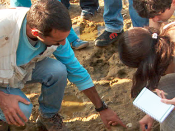Por André Matias (Centro de Física Teórica e Computacional, Faculdade de Ciências, Universidade de Lisboa, Portugal).
In several problems of interest, a fluid flows through a porous medium modifying its structure. The dynamics of this fluid-structure interaction is a problem of practical interest that encompasses several fundamental questions in Soft Matter Physics related to complex flows, instabilities, and solute transport. In this presentation, we show how to account for different phenomena such as swelling, erosion, and dissolution in the fluid flow in porous media. We also extend the continuum descriptions of the fluid flow in porous media and of the dispersion and dissolution of solute. We start by considering changes in the medium due to swelling and erosion and extend existing pore scale lattice Boltzmann models to include both. We analyze their competition and identify a transition between regimes where either swelling or erosion dominate. Next, we explore a continuum description for erosion and deposition that couples the velocity and porosity fields. The proposed model, based on the capillary model, is validated using pore scale simulations. The simulation of media with mild spatial inequalities in porosity, and erosion resistance is now possible. These inequalities over time get amplified, leading to the formation of main streamlines. We show that, even for uniform erosion resistance, a weak disorder in porosity suffices to trigger permanent channelization. The same is observed with uneven erosion resistance. We finish with a continuum equation to model solute transport and dissolution, parametrized by the Péclet number and the rate of mass transfer between the solid and the fluid. We study the time dependence of the extracted mass for different values of the parameter space. The continuum description is validated by combining extraction experiments with coffee and computational fluid dynamics. An analytical solution is derived for the limit of slow mass transfer, which is corroborated by numerical simulations.



